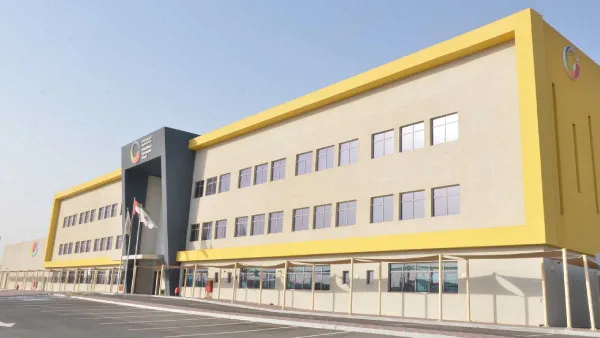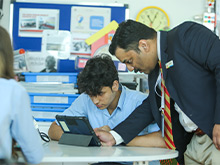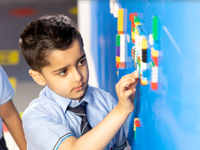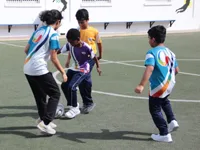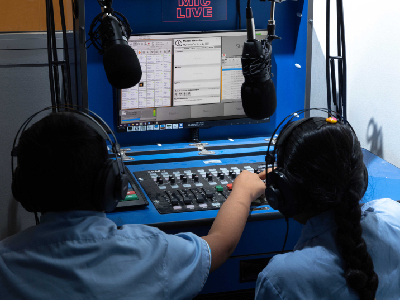The right skills and etiquette can go a long way in influencing children to grow up to be responsible and highly contributing members of society. Whether they choose to work in their own hometown or go to a different community abroad, being equipped with certain skills like inter-personal skills and cognitive development skills can help children perform well at school and communicate with their personal and professional connections with ease and have an empathetic approach when faced with conflicting situations in life. However, for all of this to happen, children need to be taught these skills at an early age.
Parents all over Abu Dhabi ought to know that the formative years of a young child is one of the most important times of life. At this age, children are exploring and understanding the world from a very unbiased perspective and therefore must be taught the right skills that will stay with them even beyond the school’s environment. Let’s take a look at how the pre-schools in Abu Dhabi have become adept at imparting integral developmental skills to our children.
Scope for pre-school education in Abu Dhabi
With more than a hundred preschools existing in the city of Abu Dhabi, parents can have a hard time choosing the right nursery for their children. However, having so many options is not necessarily unfortunate. Abu Dhabi Department of Education and Knowledge (ADEK) is responsible for overseeing the quality of education offered at each of these early education centres.
As the underlying authority in charge of issuing licenses for nurseries across the city, the ADEK ensures the highest level of education is imparted at each of these preschools. As a result, there are a number of preschool programmes in Abu Dhabi offering high-quality education to all its young students.
Also Read: Best Montessori Indian School at Abu Dhabi
Why are early childhood development skills like social, cognitive, fine-motor, listening, literacy and communication and self care skills important?
Research has shown that these skills have a direct impact on the personal independence and emotional well-being of children as they grow into adults. They can help children effectively communicate their feelings and accomplish tasks much better.
However, like most skills, these skills need to be practised. A positive learning environment allows children to practise these skills under the guidance of teachers and therefore increases the scope for improvement. Listed below are nine preschool skills that nursery schools in Abu Dhabi inculcate in all of their preschool students.
12 important skills your child will develop studying in best schools in UAE:
1. Good manners
When it comes to successful classroom interactions, manners lead the way in ensuring that children are able to gain the right attention by using the right means. Beyond the use of the golden or magic words such as ‘Please’, ‘Thank you’, ‘Sorry’, etc., manners also refer to the understanding of displaying the appropriate behaviours in different settings such as the theatre, library, etc.
2. Confident eye contact
Talking to someone while looking into their eyes is a good way to establish that one is attentive to someone’s words. In social interactions, maintaining eye contact consistently not only helps in building self-confidence but also helps children understand more about what the other person is saying by paying attention to non-verbal behaviours such as body language. While solid eye contact might seem like a difficult skill for kids of shy nature, they can be definitely taught in the right way with a little support from their teachers.
3. Listening Skills
The ability to ‘listen’ plays an important role in building positive relationships with one’s peers. Furthermore, active listening ensures that children are able to absorb more information from a conversation. However, children need to be taught the elements involved in actively listening to someone such as putting away distractions, letting the other person finish their thought, etc. The child can unlock many opportunities with this skill if taught rightly.
4. Respect for personal space
Maintaining a minimum distance from another person is what personal space is all about. At their young age, children are still discovering the rules of social interaction. Thus they might not understand their behaviour of invading someone’s personal space and vice versa. Teaching them to respect this distance with others based on the closeness of their relationship with someone can help them maintain cordial relationships in their personal and later professional lives as adults.
5. Fine motor skills
Some of the best Montessori programs have activities that require stacking, play dough and putty, scissor skills, stringing beads etc… promote fine motor skills and this helps in improving pincer-grasp which leads to better writing skills.
6. Communication Skills
Communication is the key to having a successful social life. Understanding that communication resolves a number of problems can help children turn into effective problem-solvers. Treating communication as a two-way street is important to help them ensure that their relations with others remain healthy. Being able to convey their emotions with clarity also helps children earn the respect of their peers.
7. Personal health & hygiene
A child’s attention to keeping themselves well-groomed is essential to establishing a good first impression. While children may have a stronger immunity to fight a number of diseases, being exposed to viral and bacterial illnesses can cause a change in their mood.
Teaching them habits like washing their hands after eating and brushing twice a day will stay with them even after turning into adults. Such good habits help children understand the importance of good health with respect to the needs of their body.
8. Cognitive Skills
Good cognitive skills aid in brain development which is much needed in order to reason, remember and solve problems. Cognitive skills are also important to process new information and retain it appropriately. These schools often use brain training activities to increase cognitive development.
9. Setting effective boundaries
It is very important to teach children about setting boundaries if they are to successfully navigate through life. They need to be taught that certain actions have their respective consequences and they need to be more aware of their actions.
Young ones who have a vague understanding of boundaries can have a hard time accepting the rules of society. Thus, answering their questions with the right knowledge at a young age can help them set their own boundaries and also respect the boundaries of others.
10. Being compassionate
Establishing connections with other individuals becomes much easier when one has empathy for another. Teaching children how to be compassionate makes them take a more empathetic approach while conversing with others. More importantly, children also need to learn how to be kind to themselves when the going gets tough. Thus, being compassionate can go a long way in helping kids be good to themselves as well as to others.
11. Sharing and cooperating
In order to gel well with their friends and sustain their relationships, kids need to be taught about sharing what they have with others. As children participate in group activities, they start learning how to be patient when it’s not their turn yet which improves their capacity to have respect for someone else’s time.
12. Literacy skills
When a child’s literacy development is at par with his age, it makes things a lot easier for them to grasp and understand. It gives them confidence to read and write and communicate effectively.
Conclusion
Being aware of the importance of teaching children these crucial skills is just the first step in preparing them to be self-confident adults in all their interactions. Choosing the right school that will provide a positive learning environment ought to follow.
For parents living in Abu Dhabi, they should look for schools that aim at achieving the holistic development of young children through its programme. The school should focus on providing a child-centred learning environment for kids and also use the latest innovative teaching methodologies to ensure their growth occurs at an accelerated pace.
ach and every aspect of the programme is carefully crafted to make sure that children don’t just inculcate essential preschool skills but also know how and when to practise them outside the walls of their classroom.














